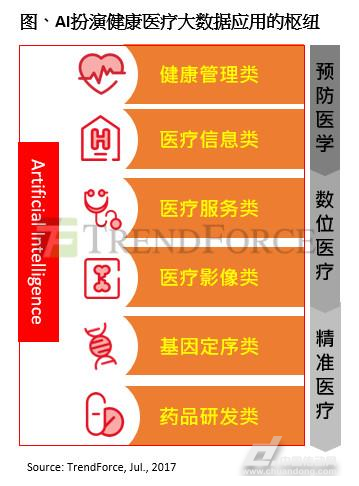The speed of the development of medical artificial intelligence, the most critical import of preventive medicine
The aging population and increasing economic development are driving up the demand for healthcare services worldwide. However, this growing need is accompanied by rising medical costs and a shortage of both medical professionals and facilities—challenges that many countries are struggling to address. According to Chibang Consulting, a global market research firm, information and communication technology (ICT) is being applied in three major areas within the healthcare sector: preventive medicine, digital medicine, and precision medicine. Among these, artificial intelligence (AI) has been most actively integrated into preventive medicine.
Cai Shang-P, an analyst at a top-level consultancy specializing in technology and industry, emphasizes that AI will play a crucial role in digital health care. By analyzing routine medical activities, patient records, test results, medical images, and the vast amount of clinical data generated across different medical fields and care models, AI can help process and interpret complex, repetitive, and intricate information more efficiently. This not only speeds up clinical responses but also enhances the accuracy of patient care by assisting doctors in diagnosis and decision-making.

Of the three categories, AI's rapid adoption in preventive medicine is largely due to its less regulated nature. These applications often involve wearable devices paired with self-health tracking systems available through apps or websites. Users can authorize data sharing without direct medical involvement, allowing real-time feedback based on comparisons with big data. In contrast, digital and precision medicine require more involvement from medical professionals and handle sensitive personal data, including genetic information. As a result, these areas face stricter regulations and higher technical barriers, making their integration more challenging.
Despite the lack of clear legal frameworks, major global software companies have already begun investing heavily in this space. The healthcare industry offers high profit margins, strong demand, and significant value, attracting tech giants like IBM, Google, Microsoft, Alibaba, and Baidu. Even with regulatory uncertainties, these companies are pouring resources into AI-driven healthcare solutions, aiming to secure a leading position in the rapidly evolving market. As AI continues to shape the future of medicine, it’s clear that the journey ahead will be both promising and complex.
Outdoor Fibre Termination Box,Fiber Optic Distribution Cabinet,Wall Mount Fiber Distribution Box,Distribution Box Fiber Optic
Ningbo Fengwei Communication Technology Co., Ltd , https://www.fengweicommunication.com